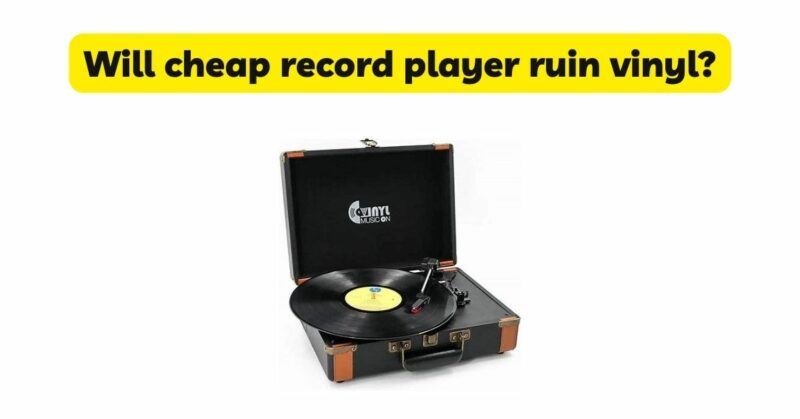The resurgence of vinyl records has led to a proliferation of record players in various price ranges, including inexpensive models. While budget-friendly record players may seem enticing, concerns have arisen about their potential impact on vinyl records. In this article, we will explore the relationship between cheap record players and vinyl, examining the potential risks and consequences of using low-quality turntables. By understanding the limitations and pitfalls of cheap record players, you can make informed decisions to protect your precious vinyl collection.
- Build Quality and Material: One of the primary concerns with cheap record players is their build quality and the materials used in their construction. Consider the following factors:
a. Plastics and Lightweight Components: Inexpensive record players often rely on lightweight plastics and less durable components, which may lack the necessary stability and rigidity to properly support and protect vinyl records during playback.
b. Poor Vibration Control: Cheap turntables may not effectively isolate vibrations, resulting in increased resonance and unwanted feedback that can impact sound quality and potentially harm the vinyl.
c. Lack of Anti-Skate and Adjustable Tracking Force: Some budget models omit essential features like anti-skate mechanisms and adjustable tracking force, leading to suboptimal tracking and increased wear on the stylus and records.
- Inadequate Tonearm Design: The design and functionality of the tonearm can significantly impact the performance and longevity of both the stylus and vinyl records. Consider the following aspects:
a. Tracking Angle and Weight Distribution: Cheap record players may have poorly designed tonearms that do not properly align with the record’s grooves. This can result in improper tracking, increased friction, and potential damage to the record surface.
b. Fixed or Non-Replaceable Cartridges: Some low-cost turntables come with fixed or non-replaceable cartridges, limiting the ability to upgrade or fine-tune the stylus or cartridge to match the specific needs of different records.
- Inconsistent Speed and Speed Variation: Accurate and consistent playback speed is essential for preserving the fidelity of vinyl records. However, cheap record players may struggle with speed stability, leading to significant variations and fluctuations. These variations can result in pitch inaccuracies and audible distortions, affecting the overall listening experience.
- Excessive Needle Wear: The stylus, or needle, is in direct contact with the delicate grooves of the vinyl record. A poorly constructed or low-quality stylus can cause excessive wear on the record surface, leading to diminished sound quality and increased risk of damage. Cheap record players often come with low-grade or poorly aligned styluses that may not adequately track the grooves or provide optimal playback.
- Lack of Anti-Resonance Measures: High-quality turntables often employ anti-resonance measures to reduce vibrations and unwanted noise during playback. However, inexpensive record players generally lack these features, resulting in increased surface noise, compromised dynamic range, and potential damage to the vinyl records.
- Maintenance and Upgradability: Cheap record players often lack the necessary provisions for maintenance and upgrades. Components such as the stylus, cartridge, or drive belt may not be easily replaceable or upgradable. This limits the ability to fine-tune the system, replace worn parts, or adapt to different playback preferences.
- Long-Term Impact: While inexpensive record players may work adequately in the short term, prolonged use can have a cumulative negative impact on vinyl records. Increased wear, groove damage, and compromised sound quality may become more apparent over time, diminishing the lifespan and enjoyment of your vinyl collection.
- Considerations for Vinyl Preservation: If you are concerned about preserving the quality and longevity of your vinyl records, consider the following recommendations:
a. Invest in Quality: Consider investing in a mid-range to high-end turntable from reputable manufacturers known for their attention to build quality, precision engineering, and sound fidelity. These record players are designed to provide optimal playback and protect the integrity of your vinyl records.
b. Proper Setup and Maintenance: Irrespective of the turntable’s cost, ensure proper setup, including correct tracking force, anti-skate adjustment, and regular maintenance. Clean your records, replace worn styluses, and align cartridges to prolong the life of your records.
c. Cartridge and Stylus Upgrades: If your turntable allows for cartridge and stylus upgrades, consider investing in higher-quality components that are compatible with your setup. These upgrades can enhance sound quality, reduce wear, and provide better tracking.
d. Consider Second-Hand Options: If budget constraints are a concern, consider exploring the second-hand market for higher-quality used turntables. Older models from reputable brands may provide better performance and build quality than inexpensive new alternatives.
Conclusion: While cheap record players may seem appealing due to their affordability, they often come with inherent limitations and potential risks to vinyl records. The use of lightweight materials, inadequate tonearm design, inconsistent speed, and low-grade styluses can compromise the sound quality and longevity of your vinyl collection. Investing in a quality turntable with proper features and build quality is crucial for preserving the fidelity and lifespan of your records. By understanding the potential consequences of using cheap record players and taking the necessary precautions, you can ensure a superior listening experience and protect the integrity of your vinyl records for years to come.


